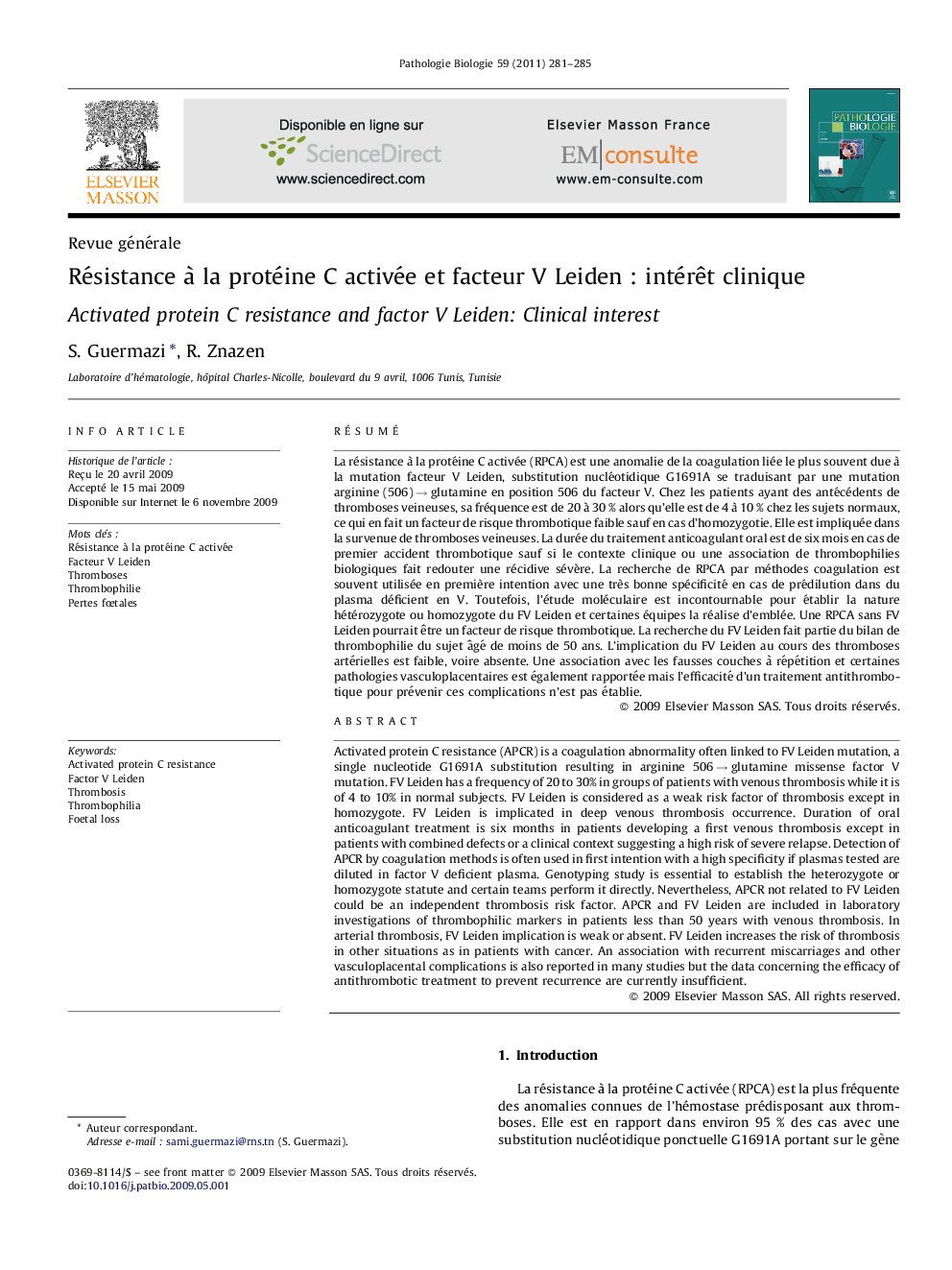| کد مقاله | کد نشریه | سال انتشار | مقاله انگلیسی | نسخه تمام متن |
|---|---|---|---|---|
| 4136251 | 1271904 | 2011 | 5 صفحه PDF | دانلود رایگان |

RésuméLa résistance à la protéine C activée (RPCA) est une anomalie de la coagulation liée le plus souvent due à la mutation facteur V Leiden, substitution nucléotidique G1691A se traduisant par une mutation arginine (506) → glutamine en position 506 du facteur V. Chez les patients ayant des antécédents de thromboses veineuses, sa fréquence est de 20 à 30 % alors qu’elle est de 4 à 10 % chez les sujets normaux, ce qui en fait un facteur de risque thrombotique faible sauf en cas d’homozygotie. Elle est impliquée dans la survenue de thromboses veineuses. La durée du traitement anticoagulant oral est de six mois en cas de premier accident thrombotique sauf si le contexte clinique ou une association de thrombophilies biologiques fait redouter une récidive sévère. La recherche de RPCA par méthodes coagulation est souvent utilisée en première intention avec une très bonne spécificité en cas de prédilution dans du plasma déficient en V. Toutefois, l’étude moléculaire est incontournable pour établir la nature hétérozygote ou homozygote du FV Leiden et certaines équipes la réalise d’emblée. Une RPCA sans FV Leiden pourrait être un facteur de risque thrombotique. La recherche du FV Leiden fait partie du bilan de thrombophilie du sujet âgé de moins de 50 ans. L’implication du FV Leiden au cours des thromboses artérielles est faible, voire absente. Une association avec les fausses couches à répétition et certaines pathologies vasculoplacentaires est également rapportée mais l’efficacité d’un traitement antithrombotique pour prévenir ces complications n’est pas établie.
Activated protein C resistance (APCR) is a coagulation abnormality often linked to FV Leiden mutation, a single nucleotide G1691A substitution resulting in arginine 506 → glutamine missense factor V mutation. FV Leiden has a frequency of 20 to 30% in groups of patients with venous thrombosis while it is of 4 to 10% in normal subjects. FV Leiden is considered as a weak risk factor of thrombosis except in homozygote. FV Leiden is implicated in deep venous thrombosis occurrence. Duration of oral anticoagulant treatment is six months in patients developing a first venous thrombosis except in patients with combined defects or a clinical context suggesting a high risk of severe relapse. Detection of APCR by coagulation methods is often used in first intention with a high specificity if plasmas tested are diluted in factor V deficient plasma. Genotyping study is essential to establish the heterozygote or homozygote statute and certain teams perform it directly. Nevertheless, APCR not related to FV Leiden could be an independent thrombosis risk factor. APCR and FV Leiden are included in laboratory investigations of thrombophilic markers in patients less than 50 years with venous thrombosis. In arterial thrombosis, FV Leiden implication is weak or absent. FV Leiden increases the risk of thrombosis in other situations as in patients with cancer. An association with recurrent miscarriages and other vasculoplacental complications is also reported in many studies but the data concerning the efficacy of antithrombotic treatment to prevent recurrence are currently insufficient.
Journal: Pathologie Biologie - Volume 59, Issue 5, October 2011, Pages 281–285